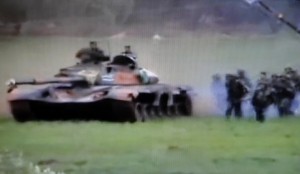 A Syria military crackdown meant to crush that country’s seven-week-old uprising intensified further Monday, as armed forces arrested hundreds of protesters, going house to house in towns and cities across the country, human rights groups and activists said.
A Syria military crackdown meant to crush that country’s seven-week-old uprising intensified further Monday, as armed forces arrested hundreds of protesters, going house to house in towns and cities across the country, human rights groups and activists said.
The scale and ferocity of the crackdown, which targeted activists in the Damascus suburbs and at least a dozen cities from the Mediterranean coast to the poor steppe of southern Syria, suggested that President Bashar al-Assad is more intent than ever on crushing the uprising, which echoes rebellions that have felled autocrats in Tunisia and Egypt.
Mr. Assad’s government, which has barred most foreign journalists from reporting on the unrest, has repeatedly tried to portray the crackdown as a fight with militant Islamists, and state media carries detailed reports of battles between Islamists and the army almost daily.
Al-Watan, a private pro-government newspaper, quoted Mr. Assad on Monday as saying that “the current crisis in Syria will be overcome and that the process of administrative, political and media reforms are continuing.” His remarks, it said, came during a meeting with a local delegation on Sunday.
Wissam Tarif, executive director of Insan, a Syrian human rights group, described the government’s actions Monday as part of what he called a cleanup operation to isolate antigovernment sympathizers and render them incapable of organizing.
“They tried to rebuild the wall of fear and they failed,” Mr. Tarif said. “So next, they will move to completely cut communications all over the country.”
Nearly all communications to besieged locales have been severed since the uprising started in March.
In Baniyas, one of Syria’s most restive cities and home to two oil refineries, more than 300 people were arrested on Monday including women and children and gunfire was heard throughout the day, according to Mr. Tarif. Phones, electricity and water have been cut since Saturday morning when at least 30 tanks raided the northern coastal city of 50,000 people.
“They want to arrest everyone who can participate in the demonstrations,” an activist in Baniyas said by phone. He also said that among those who were detained were two leading organizers of demonstrations, Mostapha Yasseen and Anas al-Shughrai and the imam of the city’s biggest main mosque, Sheikh Anas Irotah.
Al Baath, the Syrian newspaper that is the mouthpiece of the government, said in a report on Monday that the operation in Baniyas would “end within a few hours” and that “cautious calm” had been restored to the city.
Army troops also raided Homs, Syria’s third largest cities, where 14 protesters were killed on Sunday. The armed forces surrounded at least two neighborhoods and hundreds were reported arrested, residents said. Checkpoints were set up on major streets and intersections and people were searched when leaving and entering the city, according to Abu Haydar, a witness reached by phone.
He said there are reports of dead and wounded in Baba Amr, a neighborhood that was bombed overnight, but troops prevented ambulances from entering the place.
“They want to finish everything this week,” a human rights advocate in Homs said by phone. “No one in the regime has a clear policy. They cannot keep this strategy for a long time. We need political solutions, not more tanks.”
Maadamieyh, a town on the outskirts of Damascus, which has witness major demonstrations, was also raided on Monday with tanks stationed near two mosques and hundreds detained, according to activists, who said an exact number was hard to quanitify because communications had been cut.
Mr. Tarif said that residents reported seeing nine buses loaded with detainees, including women, leaving the town earlier Monday. He also said that nine other towns on the outskirts of Damascus were raided on Monday.
Backed by at least eight tanks, Syrian troops swept through hundreds of houses in Tafas, a impoverished town in the south near the restive city of Dara’a, arresting men between the ages of 18 and 45. Activists said the town was now under siege and residents reported hearing heavy gunfire throughout the day.
Lina Mansour, an activist in Damascus, said that human rights activists tried on Saturday to enter Dara’a, which has been under siege for more than two weeks, carrying food and water but that an army officer in charge told them they would have to shoot him before they could go.
“I think some army officers and troops are sympathizing with people, “ Ms Mansour said. “But they can’t do much.”
Syrian state media reported on Monday a meeting between Mr. Assad and local representatives from Maadamiyah and other Damascus suburbs during which he discussed problems in their towns and cities.
The uprising in Syria began in mid-March after authorities arrested teenagers caught scrawling anti-regime graffiti on walls in Dara’a. NYT

Leave a Reply
You must be logged in to post a comment.